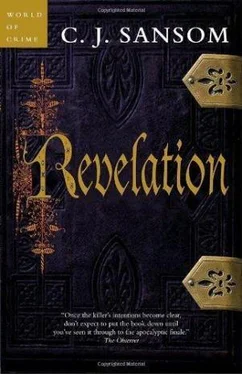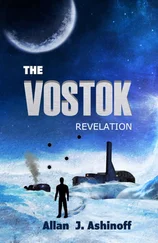'Had your husband any enemies?' Browne asked.
'None. He had barristers he did not like particularly, whom he had won or lost against in court. But that is true of every barrister in London, and they do not murder their fellows in' - her voice faltered — 'this ghastly, wicked way.'
'And no question he could have done it himself?'
The bluntness of the question appalled me, but it brought out the best in Dorothy. 'No, master coroner, none at all. Anyone would tell you the idea he did this to himself is nonsensical. I wish you had had the grace to talk to others before baldly asking me if my husband might have cut his own throat.' I felt admiration for her; her spirit was returning.
Browne reddened. He rose from his chair. 'Very well,' he said stiffly. 'That will do for now. I must go to the palace, see the King's coroner.'
He bowed to us stiffly, then left. His heavy footsteps clumped slowly down the stairs.
'Old fat fustilugs!' Margaret said warmly.
Dorothy looked up at me. Her red-rimmed eyes were despairing. 'He does not seem to care,' she said. 'My poor Roger.'
'This is just one more job to him,' I said. 'But I promise you, I will be at his heels.'
'Thank you.' She laid a hand on my arm.
'And now I will go down to Roger's chambers. I will take on what work of his I can. If you wish.'
'Yes, please. Oh, and someone must write to our son. Tell Samuel.' Her eyes filled with tears again.
'Would you like me to?' I asked gently.
'I should not ask. I—'
'No. I will do all I can, Dorothy. For you. For Roger.'
OUTSIDE, TO MY RELIEF, I saw Barak watching as Roger's body was loaded on to a cart, my coat wrapped round it. He looked downcast. I saw he was carrying a dark coat that I recognized. 'You found Roger's coat;'
'Yes. In the orchard. I thought it must be his, from the size.' I shivered, missing my own coat. 'Did you follow the prints;'
'As far as I could. They led through the orchard into Lincoln's Inn Fields, but the snow there was pretty well gone.'
'Was there anything in the pockets;'
'A set of house keys. The killer must have kept the key to the orchard. And his purse, he left his purse, with near two pounds in it.'
'Were there any papers; Any notes;'
'Nothing.'
'He went to meet a new client at an inn in Wych Lane last night.'
Barak looked over at the wall. 'Taken somewhere in Lincoln's Inn Fields, then. That's a hell of a way to haul a body.' He looked at me, frowning. 'What on earth is going on;'
Two DAYS LATER, on the Tuesday after Easter, Barak and I walked down to the river to catch a boat to Westminster. I had on a new coat; I had left my old coat with the coroner; stained as it was with Roger's blood, I could never wear it again. I had a busy day ahead, five poor men's pleas to be heard before the Master of Requests. I hoped I would also get a date for hearing Adam Kite's application.
The morning had a real touch of spring at last, the breeze gentle and moist. Normally that would have lifted my spirits; but not with what lay on my heart now. As we crossed Fleet Street on our way down to Temple Bar, we saw a penitent heretic being led along to St Paul's. He was dressed in a grey smock and carried a faggot of birch twigs in trembling hands. Ashes had been tipped over his head and shoulders, turning his hair and face grey. A rope was round his neck, and he was led along by one of Bishop Bonner's men. Three halberdiers followed, wearing swords, the little procession led by a man beating a drum. Passers-by stopped, some jeering and others looking serious. Someone called, 'Courage, brother!' and the soldiers looked round angrily. I was taken aback to see that the tethered man was the wild preacher from Newgate market; he must have been taken for unlicensed preaching. He would be brought to St Paul's Cross where Bonner would preach to him of the evils of heresy. If he were caught again he could burn.
The ice had quite gone from the river now, which was high, the grey water flowing rapidly. The wherrymen had had a hard winter, as always when the river froze, and the man at the oars of the boat we took at Temple Stairs had a pinched, hungry look. I told him to make for Westminster.
'The stairs there are broken, sir. The ice has crushed the supports, they'll have to be replaced.'
'Whitehall Stairs, then,' I said with a sigh, not relishing a walk through the Westminster crowds. The man pulled out. I sat staring over the river. I had spent much of the previous day looking through Roger's cases and giving instructions to his clerk. Then I had written a letter to young Stephen Elliard in Bristol. When I went up to see his mother again in the evening, I found she had retreated into herself and sat staring into the fire, her maid holding her hand. At length she was persuaded away to bed.
"Eard about those great fish?' the wherryman asked, interrupting my sad thoughts.
'What? Oh, yes.'
'Just bobbed up from under the ice. Almost as big as houses they are.' He nodded and smiled. 'I've seen 'em.'
'What are they like?' Barak asked curiously
'Grey, with huge heads full of the strangest teeth you ever saw. They're starting to stink now. They're cutting them open to get the fish oil, though some say they're cursed. My vicar claims they are the Leviathan, the great monster from the deep whose appearance portends the Second Coming.'
'Maybe they're whales,' I said. 'A kind of giant fish that lives in the deep sea. Fishermen speak of them.'
'This ain't the deep sea, sir. And they're bigger than any fish could be. Giant heads they've got. I've seen them, like half London.'
The boat pulled up at Whitehall Stairs. We walked under the Holbein Gate and down into King Street. I kept a hand on my purse, for Westminster was as disorderly a place as could be found in England. Ahead of us loomed the vast bulk of Westminster Abbey, dwarfing even its neighbour, Westminster Hall, where most of the courts sat. Behind Westminster Hall lay a warren of buildings, those which had survived the fire a generation ago that destroyed much of the old Westminster Palace. The House of Commons met in the Painted Chamber there, and the Court of Requests was near by.
Around Westminster Hall and the abbey was a chaos of buildings, shops, inns and taverns, serving the lawyers and churchmen and MPs who came to Westminster. Pedlars, hucksters and prostitutes always thronged the streets, and the presence of the Sanctuary at Westminster had long drawn rogues to the area. Westminster's government was chaotic, for the requests of rich citizens to have it incorporated as a city had always been rejected, and now that the abbey had been dissolved, the old secular powers of the abbot had gone.
PARLIAMENT WAS in session, and King Street was even more crowded and colourful than usual. Shops and houses were set higgledy-piggledy along the road, the large houses of rich traders with their overhanging top stories next to run-down hovels. The street stank of the many tanneries and of the brickworks on the outskirts. I remembered the complaints the judges had made last year, that during their robed annual procession to Westminster Hall they had had to squeeze their way past sheep and cattle being led to the market.
We jostled our way down to Palace Yard, past shopkeepers calling their wares. There were innumerable pedlars, some calling from donkey carts, others with trays of cheap, skimble-skamble stuff round their necks. Barak waved them off if they approached. I saw a gang of ragged but muscular young men watching as a haughty- looking middle-aged man dressed in a long sable-lined coat and a fine doublet slashed to show the silk lining, walked slowly along. An MP up from the country, probably, who knew no better than to parade his wealth in King Street. Had it been after dark, I would not have given much for his chances.
Читать дальше












